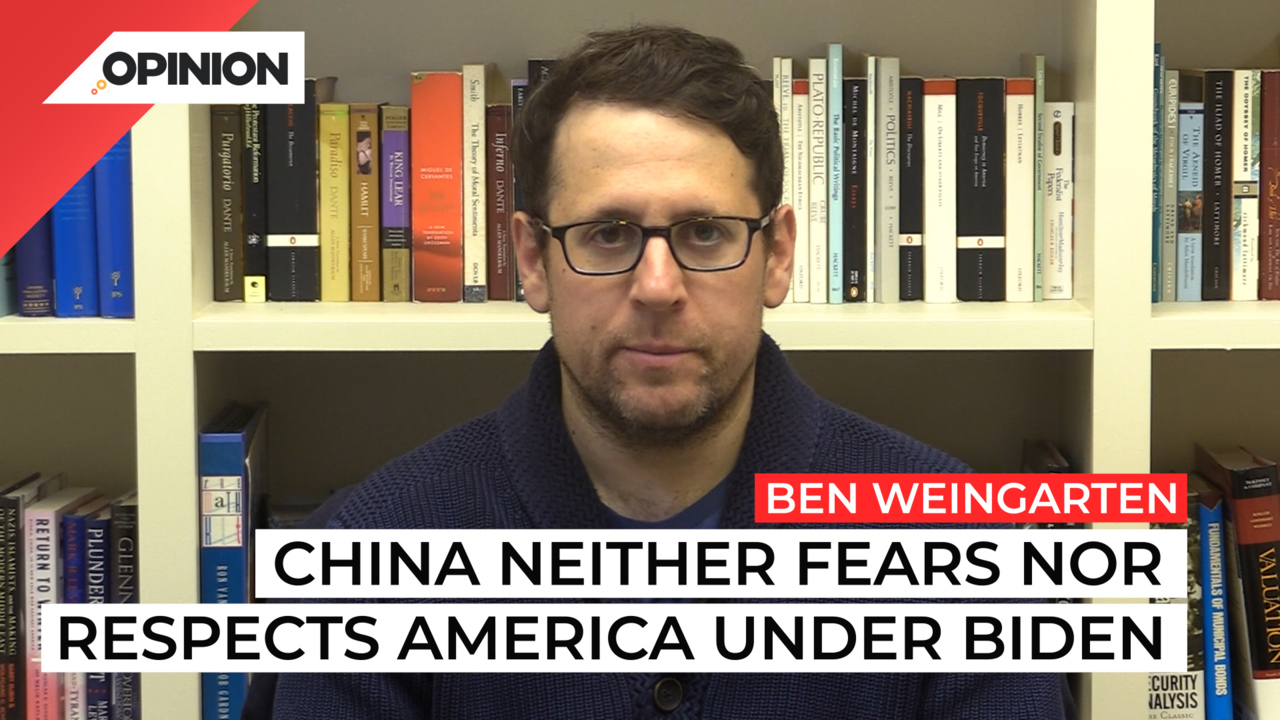
Commentary
-
Our commentary partners will help you reach your own conclusions on complex topics.
China neither fears nor respects America under a compromised Joe Biden. So no one should have been surprised when Beijing brazenly breached our airspace, sending a spy balloon capable of delivering an EMP or hypersonic missile soaring over our most sensitive sites on the eve of a high profile U.S.-China meeting.
This was a power play. But it also likely aimed to test our reflexes and resolve. Nor should anyone have been surprised that a Biden administration that has repeatedly kowtowed to China failed this test. Still, baffling aspects of Biden’s feckless response raise questions maybe more troubling than whatever China might have gleaned from the balloon, and about our defensive capabilities.
Among them, would the Biden administration have ever shot down the spy balloon had civilians not seen it?
Per Bloomberg, Biden administration officials were aware the Chinese balloon had entered U.S. airspace several days before the public, but were intent on “keeping it on the down-low” with the Blinken-Xi Jinping pow-wow at stake.
Officials were reportedly concerned about “a heated political environment ahead of 2024 elections, with Republicans agitating on which party could strike a harder or tougher line on China.” So Team Biden kept the breach of our sovereignty hush-hush for political reasons.
OFF-CAMERA NARRATOR: Well, hello everbody. I am sitting in my driveway in Billings, Montana and right there is a ground-stop on our airport and this thing is up in the sky.
Only when those pesky Montanans identified the balloon was the administration forced to respond.
The Pentagon reassured us the balloon didn’t pose a threat, and was of “limited additive value from an intelligence collection perspective.”
So this was no big deal – and balloons breached our airspace under Trump too, we were told. Only after the balloon was shot down, did Biden say he always wanted to shoot it down.
But that Biden did not strike the spy balloon the second it entered our airspace; that initial reporting on White House deliberations emphasized its political focus; and that the administration downplayed the danger of the balloon and cast its incursion as commonplace, call into question his candor.
Second question: Why did Biden let the balloon traverse the entire U.S.?
The rationale for not shooting down the balloon after it entered our airspace was one of fear that those on the ground could be harmed. But this is dumbfounding when you consider the argument was made when it was known the balloon was traveling over the third most sparsely-populated state by density in the country. Do we really lack the capability to safely pop a balloon over a state with fewer than 8 people per square mile? Instead, the Biden administration let the vehicle surveil the country unimpeded.
That it was shot down, sending its pieces flying, only after emerging over the Atlantic Ocean, necessitated a seemingly complex recovery effort on the water’s shifting surface and beneath it. According to the Pentagon, “it’s possible that some debris could escape notice and wash ashore.”
Another question: Is the related claim there was a national security benefit to letting the balloon fly legitimate?
Two days after the balloon was shot down, NORAD’s Commander claimed letting the balloon fly gave intelligence officials “the opportunity to assess what they were actually doing, what kind of capabilities existed on the balloon, what kind of transmission capabilities existed.” But did the benefits outweigh the costs? Couldn’t officials have assessed the balloon’s capabilities and then promptly shot it down, rather than risk potential compromise of our military sites? Is this just rationalization after the fact?
Did American forces really fail to detect previous balloon breaches?
If so – as has been claimed – that calls into question the entire integrity of our air defenses. If not, and top administration officials during the Trump years were kept in the dark about balloon violations of our sovereignty – for any reason – those officials having been totally blindsided by such claims, this would constitute unconscionable insubordination.
Lastly, what role did Gen. Milley play in all this?
The Chairman of the Joint Chiefs of Staff reportedly advised President Biden not to shoot down the spy balloon as it floated over America.
His position is worthy of scrutiny given what we know about his posture towards China. Remember, in the waning days of the Trump presidency, Gen. Milley told his Chinese counterpart “We are not going to attack or conduct any kinetic operations against you.” He reportedly added, “If we’re going to attack, I’m going to call you ahead of time. It’s not going to be a surprise.”
The general claimed he was seeking to defuse hostilities between the U.S. and China – that intelligence indicated China believed a U.S. attack might be imminent.
Trump said he was totally unaware of these calls, and that if reporting was true, the general should be tried for treason. Gen. Milley in the past has said that China “is not an enemy.”
Congress ought to ask him about his role in spy balloon deliberations, what he might have communicated to his Chinese counterparts, and whether he acted in America’s national interest.
-
Humphrey’s Executor should be slated for execution
President Trump’s attempts to purge and downsize the federal workforce across myriad agencies and departments have been met with swift legal challenges. An array of judges have already issued preliminary injunctions, restraining orders and others rulings against the administration’s actions. Much of that pushback comes from the fact that the laws governing these agencies have… -
Gabbard, Patel key appointees in fight against Deep State
As President Donald Trump’s cabinet picks continue to be confirmed, two nominees have emerged as particularly divisive. The U.S. Senate confirmed former Hawaii Congresswoman Tulsi Gabbard as the eighth Director of National Intelligence (DNI), while the Senate Judiciary Committee recently voted along party lines to advance Kash Patel’s nomination as FBI director. Both nominations have… -
Trump, Musk are right to terminate woke USAID
Elon Musk came under heavy public criticism after he abruptly and unexpectedly terminated USAID, the United States Agency for International Development. Experts said that the swift termination puts millions of lives in immediate danger around the world, jeopardizes American national security interests at home and abroad and also threatens the integrity of the U.S. domestic… -
Trump is right, Palestinians must be relocated out of Gaza
On Saturday, Feb. 1, U.S. President Trump spoke with Egyptian President Abdul Fatah el-Sisi, urging him and Jordan’s King Abdullah II to accept at least 1.5 million Palestinian survivors of the war in Gaza. Critics have attacked the proposal as tantamount to forced displacement and ethnic cleansing — Donald Trump, in his own words, suggested… -
Trump’s Jan. 6 pardons aim to restore liberty, justice
President Trump has defended his decision to issue pardons and halt prosecutions for the more than 1,500 individuals charged in connection with the Jan. 6, 2021 Capitol attack. The pardons included violent extremists who had been convicted of assaulting law enforcement officers and of plotting sedition against the United States. Some Republicans — and even…
Latest Opinions
-
 Getty Images
Getty Images
Trump says southern border ‘CLOSED’ as crossings fall to at least 2000 levels
-
 Getty Images
Getty Images
Kroger CEO Rodney McMullen resigns in wake of behavior investigation
-
 AP Images
AP Images
Fierce storm ends Lithuanian rower’s dream of solo Pacific crossing
-
 Reuters
Reuters
‘Anora’ leads with five Oscars at 97th Academy Awards
-
 Getty Images
Getty Images
US to halt offensive cyber operations against Russia: Reports
Popular Opinions
-
In addition to the facts, we believe it’s vital to hear perspectives from all sides of the political spectrum.






